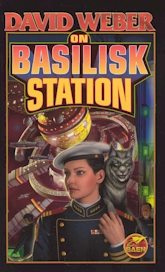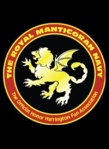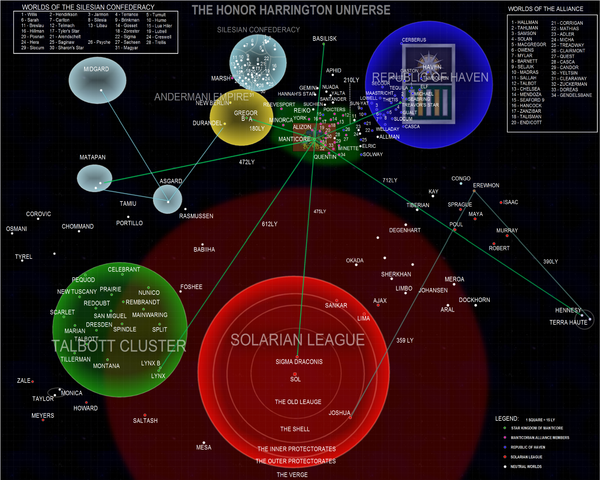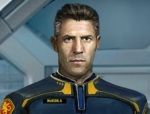I had never heard of Honor Harrington at all until just last year, when Matthew finally insisted — rather than suggest — that I read On Basilisk Station, by David Weber. Oh, sure, he might have mentioned it a time or two, but I filed it away in the list of “yet another book series I have to read but probably won’t ever get around to.” I was missing out, and I weep for my own stupidity.
Fortunately for you, I am here to introduce you to my friend, Honor Harrington, one of the greatest characters in science fiction, so you won’t have to miss out for so long, like I did.
The series is one that grabs you and won’t let you go. It’s one that makes you stay up to completely unreasonable hours, just to see what happens next. The characters are compelling — especially Honor herself — the stories are fascinating, and the universe is widespread and realistic (at least, to a science dummy like myself). If you think Star Trek is good . . . you ain’t seen nothin’ yet.
This isn’t just a book series; it’s a whole culture. It has multiple spinoffs written in the  same universe, a young adult series, a collection of short stories, and, of course, an official (and totally hardcore) fanclub: The Royal Manticoran Navy. I’m posting this review here in honor — haha! Pun! — of my own trip to HonorCon this weekend.
same universe, a young adult series, a collection of short stories, and, of course, an official (and totally hardcore) fanclub: The Royal Manticoran Navy. I’m posting this review here in honor — haha! Pun! — of my own trip to HonorCon this weekend.
Once again, I’ll try to give you a general review of the stories in general, so that there will be no spoilers to ruin your first reading. I’ll keep it about general themes, characters, the science, and so on, so that you can enjoy the tales for yourself. I might skip around between books a bit, but that’s just to make sure you actually go out and read them.
So, without further ado: *ahem*
Attention, all hands:
From Admiral Sir Lucien Cortez, Fifth Space Lord, Royal Manticoran Navy: to Commander Honor Harrington, Royal Manticoran Navy, Thirty-Fifth Day, Fourth Month, Year Two Hundred and Eighty After Landing. Madam: You are hereby directed and required to proceed aboard Her Majesty’s Starship Fearless, CL-Five-Six, there to take upon yourself the duties and responsibilities of commanding officer in the service of the Crown. Fail not in this charge at your peril. By order of Admiral Sir Edward Janacek, First Lord of Admiralty, Royal Manticoran Navy, for Her Majesty the Queen.
Captain, you have command of my complete attention for the duration of the entire series.
The series begins with, as I said, On Basilisk Station, in which we see Commander Honor Harrington as she takes command of HMS Fearless, a light cruiser. As the main series alone has thirteen installments, you get to spend quite a bit of time with Honor Harrington, and she doesn’t stay a Commander for long.
Just as a basic overview of the setup: this is military science fiction, of course, and spends most of its time in that realm. You get equal parts politics in some of the books (my favorites, actually, like book four, Field of Dishonor, for example), and a good deal of commentary on governments and societies. The main villain of the series is The People’s Republic of Haven.
To make things simple, here are some comparisons. The Star Kingdom of Manticore is the British Empire; The People’s Republic of Haven is a cross between Soviet Russia and post-Revolution France; the Anderman Empire is Germany; and the Solarian League is basically the United States, only neutral, like Switzerland, but managed by the UN (yes, I know, terrifying thought). Add to that a couple of independent systems, and you have enough of a mix to keep things very interesting.
 If you pick up On Basilisk Station, the first few pages give this information to you, so I wouldn’t be giving out too many spoilers. The People’s Republic of Haven is, basically, a socialist state, and in order to keep its economy functioning in the face of increases in the Basic Living Stipend given to its citizens, it has had to turn conquistador. They use up the resources they have, and are forced to continually move on to other systems, absorb them, use up their resources, and repeat. Unfortunately, they can’t keep going like that without taking on the Royal Manticoran Navy, which is the elite force in this part of the universe.
If you pick up On Basilisk Station, the first few pages give this information to you, so I wouldn’t be giving out too many spoilers. The People’s Republic of Haven is, basically, a socialist state, and in order to keep its economy functioning in the face of increases in the Basic Living Stipend given to its citizens, it has had to turn conquistador. They use up the resources they have, and are forced to continually move on to other systems, absorb them, use up their resources, and repeat. Unfortunately, they can’t keep going like that without taking on the Royal Manticoran Navy, which is the elite force in this part of the universe.
And there you go. Perfect opportunities for plot!
As for the science in itself, I’m not much of a judge on how strictly accurate it is. The ships in the Honorverse are FTL, or Faster Than Light. David Weber does spend an enormous amount of time telling you all about how the engines operate, how fast they can go, the limitations that puts on ship-to-ship combat strategies, the weapons, how well they work, their disadvantages, and so forth and so on. That may seem like a lot, but it’s not strictly “hard” science fiction. I said that Weber tells you how the engines operate. Actually, he really doesn’t — at least, not in real science. It’s more that he tells you exactly what they can do, and disguises it in “real” science. He fakes the “hard” science fiction so well and so consistently, that you’re completely fooled.
The best part of that particular strategy is that he has a particular talent for making an infodump NOT seem like an infodump. You’re reading what seems to be technical specifications for an FTL engine or a gravity wedge, and yet, you’re not bored. You’re not going, “enough, already, let’s get back to the plot.” One minute, you’re reading the infodump-that-is-not-an-infodump, and then you’re right back into the plot. It’s seamless and very well done. Otherwise, my English Degree brain would have taken one look at the explanations for how the stuff works, and gone AWOL.
Weber does a wonderful job of maintaining the supporting cast of characters. Honor Harrington is the star, obviously, but the people around her are very three-dimensional. You care almost as much about Lt. Cmdr. Alastair McKeon and (one of my personal favorites) Ensign Prescott “Scotty” Tremaine. They recur throughout the books, and you’re always happy to see them back.
Even the bad guys are three-dimensional characters. In many of the books, the point of view changes to one of the members of the People’s Republic of Haven, and rather than being just filler, it grabs you just as much as Honor Harrington’s story does. Eventually, there are some characters over in the PRH that you’re rooting for! Nope, not telling.
Of course, you’re probably wondering why Honor Harrington has a strange-looking cat-like creature perched on her shoulder on the cover art for On Basilisk Station. That would be Nimitz, her treecat. He’s definitely not just a pet. In fact, he’s one of the major supporting characters. Not saying any more.
But I wanna!
Nope, shutting up.
In book two, The Honor of the Queen, you meet the Graysons, who are just plain wonderful. They’re a bit strange, especially to Honor Harrington, but they’re lovable, all the same. As this is The Catholic Geeks, I should probably point out that the society on Grayson is a bit of an odd combination of Fundamentalist Protestantism, and Mormonism. It takes a little getting used to, but Weber is very good at writing their society, and after a while (probably by the time you get halfway through book two), it’s normal for Graysons, and you take them as they are presented. Plus, opportunities for plot!
. . . must . . . not . . . TELL!
 Seriously, go read the series, so I can talk about it without spoiling it.
Seriously, go read the series, so I can talk about it without spoiling it.
I have a minor criticism of a few things that occur later in the series. The first is Honor Harrington’s love life. In the first few books, she has one love interest (not telling you who it is), and I have to say that the presentation of their relationship is clean. You get no more details than you really need, nothing graphic, nothing even in poor taste. Of course (again, we’re at The Catholic Geeks, so I have to put this in here), when I say “relationship,” I don’t mean “marriage.” But we can deal with that. Plus, the two of them are just that perfect together.
Later on, however (book ten, War of Honor), there’s another relationship that Honor has that really jarred me. I won’t say who it is, but again, for the sake of this Catholic blog, I’ll reveal that it is with a married man. What really bothered me (more than the initial and general dislike of the scenario for the hero you have grown to know and love by this point), was that you were oddly rooting for all three parties involved, which makes no sense. From a purely storytelling point of view, I don’t think that the relationship and the resulting plot-worthy drama fit with Honor Harrington’s character as it had been previously established. Even so, the books are still well worth reading. You just have to kind of roll your eyes and go with it.
My major complaint, however, is the main spinoff series.
In general, I don’t like spinoffs. You can have sequels until you turn blue in the face, but there’s something about diverting the story onto a different track that just doesn’t sit well with me. It is recommended by most fans that you read the books in the order in which they were published. That means that after War of Honor, you have to read Crown of Slaves, which was co-authored by Eric Flint.
I only made it about two-thirds of the way through before abandoning it in complete disgust, and quite frankly, I’ll never touch anything written by Eric Flint ever again. He cannot be trusted, and I don’t want to have to go to confession after reading a novel.
Now, maybe some people don’t mind X-rated content in their books. That’s fine — you go enjoy them elsewhere. But this is a Catholic blog, and I’m talking to the Catholics who do care about the moral content of the books they read. The plot line I mentioned above, with Honor Harrington and her affair, can be (mostly) excused, because we’re talking about a society that isn’t like ours, and we can (for the sake of the story), agree to disagree on the objective wrongness of the situation, and continue on with the rest of the story without poisoning our conscience. We know better; reading the books isn’t going to cause any of us to end up with a badly formed conscience or moral standard.
Reading disgusting blow-by-blow sex scenes in Crown of Slaves, on the other hand, is quite different.
Self-editing (“Oh, I can see where this is going, I’ll skip the next few pages and get on with the plot.”) is possible, but dangerous if you don’t have the maturity to do so. Personally, I find avoiding the scenario entirely to be the preferred course of action.
But that wasn’t the only objectionable thing. Even with self-editing, blasphemy is impossible to stomach. Once I encountered what was supposed to be a joke — not even something that was plot-relevant! — I stopped and deleted the book from my Kindle. I’ll never go back to the series at all, and I can’t in good conscience recommend them to anyone here, either.
After that, I skipped the spinoff books and went right on to the next one in the main series, At All Costs. I admit, some of the events were a little confusing, but fortunately, David Weber managed to give a short recap for most things, and I was reading the books I truly enjoyed without being so confused that I had to stop. It’s a bit of a rough ride, because some of the details you have to assume and fill in for yourself, if you don’t read the spinoff series, but it is possible.
I haven’t finished the main series yet; I still have A Rising Thunder, and Shadow of Freedom to go, so I can’t say how they end. Mission of Honor was slowing down a little, compared to the other books, but by this point, Weber is juggling several different plot lines, and all the characters that go with them. You spend a little less time with Honor personally, and more with some of those great supporting characters, and it’s different, but not terrible. Personally (and this is just my opinion; you can take that for what it’s worth), I’d have preferred a little more Honor and a little less Other Guys, but I didn’t write it.
It may sound like I just shot my “this is wonderful!” review in the foot, but trust me, I didn’t. Any series — TV shows or books — that runs for such a long time (the first book in the Honorverse was published in 1993) is bound to have a few duds in it. I’ve read the first six books in the series at least three times. Each. And I only started the series less than a year ago.

That’s how great they are. I joined the fan club (Spacer Second Class Lori Janeski, Grayson Space Navy, at your service), and I’m on my way to HonorCon, because yes, I love it that much. I love Weber’s stuff that much. My serious complaint, as you can see, is only for the spinoff, and he didn’t write that, fortunately. I can just continue on my merry way without Eric Flint, and be perfectly satisfied.
I recommend you do the same. Immediately. You have no excuse; On Basilisk Station is free if you have a Kindle. Go now. This is an order. Wait . . . I’m only Spacer Second Class, so I guess I can’t really order you to do much of anything . . . but still. Go read, as fast as you can. You won’t be disappointed.
 Follow the squirrel minion to get to Lori’s website, Little Squirrel Books.
Follow the squirrel minion to get to Lori’s website, Little Squirrel Books.







I wasn’t a big fan of the Crown of Slaves series either. Don’t miss the Saganami Island series – you get a lot more Mike Henke, which is always a good thing.
LikeLiked by 1 person
Pingback: Are the Honor Harrington Books Too Feminist? | The Catholic Geeks
Pingback: A Tale of Two Awards | The Catholic Geeks